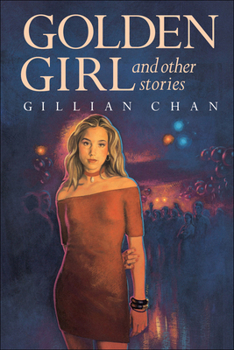Golden Girl and Other Stories
Select Format
Select Condition 
Book Overview
On first glance, they seem like just a regular bunch of kids. The school runt. The science nerd. The mouse. The tough new kid. Mr. Average. And the golden girl. At school, they all follow the same... This description may be from another edition of this product.
Format:Hardcover
Language:English
ISBN:1550743856
ISBN13:9781550743852
Release Date:June 1994
Publisher:Kids Can Press
Length:128 Pages
Weight:0.55 lbs.
Dimensions:0.3" x 5.5" x 8.6"
Age Range:11 to 15 years
Grade Range:Grades 6 to 10
Customer Reviews
2 ratings
Linked short stories
Published by Thriftbooks.com User , 22 years ago
The teens in Golden Girl are not sweetness and light, and neither are the adults. The stories and the characters ring true. What I really like about this book is that all the stories stand alone, and yet they're linked. I read the whole thing in one sitting and all I could think was that I wanted more. So I got Glory Days, and it is just as good!
Insight into the Lives of Teens
Published by Thriftbooks.com User , 23 years ago
I like this book. Chan's style is clean and confident, and the cliches she employs are cliches precisely because they accurately reflect the reality of teen-age life. In the first story, "The Buddy System," the protagonist Dennis makes it clear what kind of book this is not: "In all those books they have in the library, the ones for `young adults,' Buddy and I, the two misfits, would team up and through a series of moving adventures would become loved by one and all. Now you know and I know that's a load of crapola." He goes on to explain that because other kids have Buddy to pick on, they leave him, Denis, alone. All the stories in this collection are told in the fist person, which gives them an immediacy and authenticity. Gillian Chan is a adult, but she captures the cynicism toward adults and the adult world that many teens feel. In the title story, Donna, the daughter of a factory worker, is painfully aware of the differences between her life-chances and those the her supposed best friend Anna, the `Golden Girl,' whose father is the richest man in town. When Anna breezily refers to a local factory owner by his first name, Donna tells the reader that all she knew about the man is that she would "do just about anything not to end up working for him when I was out of school." Anna's obliviousness to class differences makes Donna's clear-sighted observations of them all the more poignant. The adults in this book are not particularly competent or even likable. In "Elly, Nel and Eleanor," the father, instead of protecting his daughter from her neurotic mother, waltzes out on them both. In "Small-Town Napoleon," the protagonist's mother sympathizes with her son's desire to act in the school play, but is unable to effectively stand up for his right to do so, or to protect him from his father's foul temper. While a few of the teachers are portrayed as sympathetic (particularly to the `good' students) others range from incompetent to malicious. In `The Buddy System," Dennis tells us that one teacher, having contended for years with the Buddy's four older brothers, takes "a sick satisfaction in seeing Buddy suffer." A strong feature of this book is the way characters pop up in more than one story. Bob, the villain of the first story, is also the sympathetically portrayed protagonist of the last one. This gives the book a depth that it would otherwise lack, and serves to remind young readers that there is such a thing as `unreliable narration' (in life as well as art). I would recommend this book to anyone who is, was, or is about to become, a teenager.





